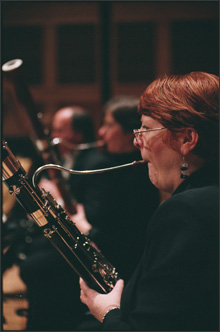
INCITING VIOLENCE: Dissonant bassoon work
angered Parisians in 1913. |
Fist-fights in the aisles, taunting from the audience, and a riot at Merrill Auditorium? If history were to repeat itself, this would be the scene for one or both of the Portland Symphony Orchestra’s upcoming Stravinsky Celebration concerts.
When Igor Stravinsky’s famous work, The Rites of Spring, premiered in Paris in 1913, the audience began booing in the first few seconds, protesting the dissonant bassoon solo that opens the piece. This quickly devolved into a violent riot that required police intervention.
Though the audience at a typical PSO concert is unlikely to erupt into fist-fights and riots, some unsuspecting audience members may be shocked by the intensity — what has been called the “sexuality” — of the Stravinsky works in two upcoming concerts.
At the November 4, performance, the featured work, Stravinsky’s Pulcinella, is sandwiched between two Mozart works and the Elgar Serenade in E minorfor Strings. This should act as riot protection, and should keep the dissonance protesters in their seats. Pulcinella is on the tamer end of Stravinsky’s often rhythmically and tonally challenging compositions. It is the first of many neoclassical works for Stravinsky and is based on an 18th-century work by the little-known composer Pergolesi.
Perhaps slightly more riotous will be the concert on November 13. Conductor Joseph Silverstein will warm up the audience with a Mendelssohn overture, then turn the spotlight over to award-winning violinist Augustin Hadelich for a performance of Dvorak’s Violin Concerto.
Then, the gem of the show: Petrouchka.
The story behind the famous ballet is worth knowing, especially before listening to the music performed (rather unfortunately) without the dancers. Stravinsky wrote this work with a Russian burlesque in mind, which most likely contributed to the Vienna Philharmonic refusing to perform the piece when it first came out, calling it “dirty music.”
Petrouchka is a Russian puppet made of straw and sawdust who is capable of emotions (think Pinocchio). He is imprisoned in a dingy cell by his cruel wizard master, but breaks free after he falls desperately in love with a ballerina puppet. He challenges the ballerina’s lover, the Moor (also a puppet), to a battle for the ballerina. The Moor beats him, then hacks him to death with an axe. But Petrouchka rises as a ghost to haunt his former master and then turns just before the end of the work to make a suggestive gesture to the audience.
“Petrouchka’s ghost is the real Petrouchka,” said Stravinsky in an interview for the 1960 book Memories and Commentaries. “His appearance at the end makes the Petrouchka of the preceding play a mere doll. His gesture is not one of triumph or protest, as is so often said, but a nose-thumbing addressed to the audience.”
Just when you thought classical music was safe, Stravinsky makes his best attempt to insult the audience through the use of a strange, Russian puppet and good dose of polytonality. Polytonality is what dissonance protesters are rioting against; it is the act of two or more musical keys being performed at the same time.
If going to see a ballet without the dancers seems odd to you, then you’re not alone.